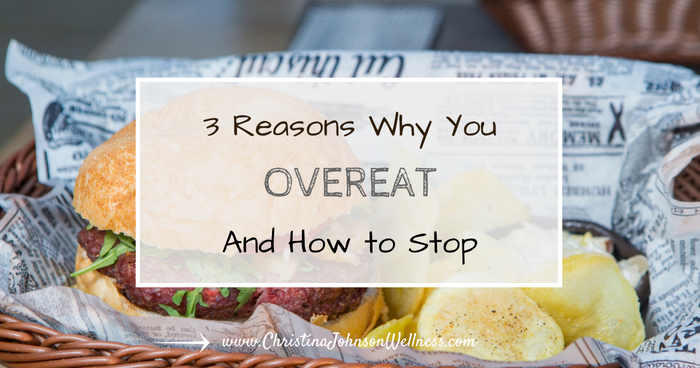More than once have I reached for my favorite Brookside Dark Chocolate Pomegranate Bites (do you know the ones I’m talking about?!?), fully intending to savor and enjoy just a couple of them, only to quickly return to the bag for one more small handful…followed by another…and then another.
It’s taken me longer than necessary to realize that I just need to stay away from those delicious fruit flavored treats! Because as healthy of an eater as I am (most of the time!), I feel out of control once I start eating them.
After talking with hundreds of people who struggle with their weight, I know that I’m not the only who feels out of control around certain foods.
But, do you ever wonder why you overeat when you know you need to stop? Why you continue eating long after you feel full?
I am NOT going to tell you that you just need more willpower. Because willpower has very little to do with this type of overeating.
Let’s look at 3 reasons why you overeat and then 4 tips to reduce overeating. Once you deal with the issue of overeating, it will be much easier for you to reach a healthy weight and to improve your health!
Before I continue, though, please note that there is a difference between overeating and binge eating. If you feel that binge eating is an issue for you, then I encourage you to seek professional help to address that issue.
3 Reasons Why You Overeat
An Evolutionary Drive to Eat
Our early ancestors had to hunt and search for their food. It took a lot of time and effort to find food, so when they did have access to it, they ate it. And, they ate ALL of it!
We have an innate drive to overeat when food is available, and it served our ancestors well. It allowed them to store up energy for times when food was scarce.
But, fast forward hundreds of years, and few Americans face that type of food scarcity. We actually have the opposite problem…food is constantly available to us any time of the day!
In spite of our easy access to food, we still have that biological drive to eat when food is in front of us.
It’s important to realize we have this innate drive to gorge ourselves at meal times so that we can implement strategies to counteract it.
Hyperpalatable Foods
Here’s another deviation from how our ancestors ate…instead of eating food that is found in nature, we eat food that has been manufactured and engineered by food scientists.
Do you know what a primary goal of many food manufacturers is? It’s to make food “hyperpalatable”. In other words, food is engineered to literally be irresistible. These processed foods activate the pleasure centers of our brain, which cause us to desire more…even when we’re full!
Processed foods are manufactured to have the right texture and combination of flavors that make them hard to resist. In addition, they purposefully require little chewing so that we quickly go back for more before we realize we’re stuffed.
So, remember when I ate those first couple Brookside chocolates and then quickly reached for another handful? That manufactured chocolate goodness was simply doing its job!
Mindless Eating
How often do you eat on the go? Or eat a meal while watching TV or working on the computer? Or try to sneak in a few bites while you’re taking care of the rest of the family?
Mindless eating is another culprit that leads to overeating. When we eat quickly and aren’t paying attention, it’s easy to eat more than we need to. In addition, we don’t notice the signals our body sends us when we’re full.
4 Ways to Reduce Overeating
Knowing why you overeat is important, but how do you actually overcome these obstacles?
Let me share with you 4 of my favorite strategies that work amazingly well for both myself and my clients. The best part is that they don’t require relying on willpower or counting calories!
- Eat less processed food. This is the first step I recommend to all of my clients. By eating less processed food, you will avoid most of the hyperpalatable foods that lead to overeating. Focus instead on eating real, whole foods. These foods will keep you full and satisfied so that your cravings and desire to overeat diminishes drastically.
- Listen to your hunger signals. Once you reduce processed foods and refined sugars and then begin to eat more natural, unprocessed foods, your hunger signals will begin to work again. This is great news! When you learn to pay attention to the signals your body sends you, you will notice when you are physically hungry and need to eat and when you are full and can stop eating.
- Eat slowly and mindfully. When you slow down and pay attention to what you are eating, it’s amazing how much more you enjoy your food. You will also notice when you feel full and, as a result, will naturally eat less.
- Get support. Let’s face it…sometimes it’s challenging to make these types of changes on your own. It can feel overwhelming to know where to begin. It can be frustrating because it seems like NOTHING has worked for you in the past. And it can be confusing because there is so much conflicting information about health and nutrition out there.
I’ve developed a proven process to help people quit overeating so that they can lose weight for good and improve their overall health. If you’d like someone to guide you through the process, I’d love to offer you a free consultation. We can talk about your unique situation and figure out if my process can help you reach your goal to finally lose weight and feel comfortable in your body. Simply click here to apply for a complimentary discovery session.
Why You Overeat…A Key to Weight Loss
Understanding the reasons why you overeat and taking steps to avoid this type of eating is a great way to begin your weight loss journey and to find lasting results.
While simply counting calories is not the solution to lose weight, reducing the number of times you eat when you’re not physically hungry can truly be life changing!



